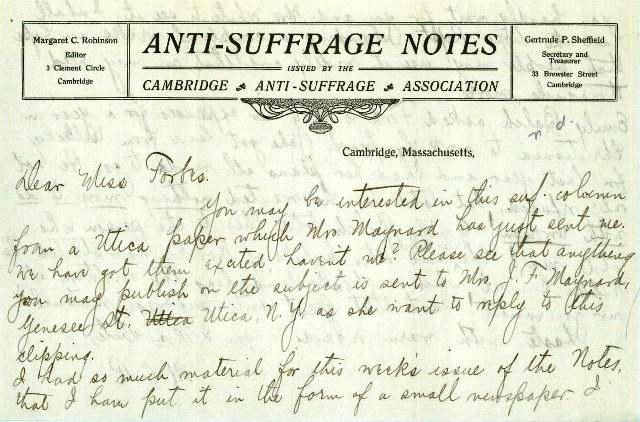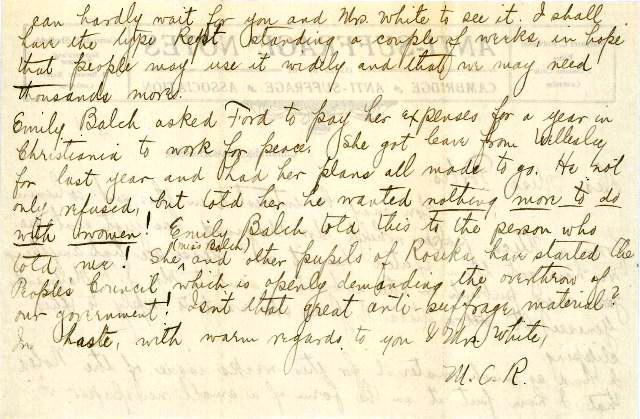By Anna J. Clutterbuck-Cook, Reader Services
In 1917 Margaret C. Robinson picked up her pen and wrote a note to her friend and fellow anti-suffrage activist Mary Bowditch Forbes. In addition to passing along a pro-suffrage newspaper column a friend had forwarded from Utica, New York, and apprising Mary Forbes about her high hopes for the latest issue of her Anti-Suffrage Notes newsletter, Margaret Robinson gleefully offered up a juicy piece of political gossip:

Emily Balch asked [Henry] Ford to pay her expenses for a year in Christianin [,Egypt] to work for peace. She got leave from Wellesley for last year and had her plans all made to go. He not only refused but told her he wanted nothing more to do with women! Emily Balch told this to the person who told me! She ^(Miss Balch) and other pupils of Rosika [Schwimmer] have started the People’s Council which is openly demanding the overthrow of our government! Isn’t that great anti-suffrage material?

What is the truth behind this second-hand hearsay? A bit of research using the MHS reference resources fills out this story in more detail. Emily Greene Balch (1867-1961) was a professor of sociology and economics at Wellesley from 1896 to 1918. She was a politically active pacifist and a founding member of the Women’s International League for Peace and Freedom (WILPF). In 1915 she stood as a delegate to the International Congress of Women at The Hague, at which female peace activists from North America and Europe attempted to broker an end to the First World War. The following year, while on sabbatical from Wellesley, she took part in the International Committee on Mediation in Stockholm, Sweden, with financial support from industrialist Henry Ford. Ford had supported other women peace activists, including Rosika Schwimmer, in their work before — so Emily Balch may have had good reason to believe he would be interested in supporting further ventures.
As the United States entered World War I in April of 1917, Balch took an additional year of unpaid leave from Wellesley to pursue anti-war activism. During this year she helped organize the People’s Council of America for Democracy and the Terms of Peace, a group opposed to the U.S. involvement in the war. The pacifist position during wartime was almost universally seen as unpatriotic (as Robinson notes, tantamount to “openly demanding the overthrow of our government!”) and Wellesley was one among many institutions of higher learning to curtail their faculty’s academic freedom by demanding they not speak out against the war. Emily Balch’s resolute anti-war stance led the Trustees of Wellesley to decide not to renew her contract for the 1918-1919 academic year. Margaret Robinson and Mary Forbes likely would have approved their decision. In 1946, Emily Balch was awarded the Nobel Peace Prize for her work — a recognition that would surely have been a bee in the bonnet of these two fellow New Englanders.
Robinson’s original letter can be found in the Mary Bowditch Forbes Papers here at the MHS; we also hold a small collection of materials related to the Massachusetts Public Interests League, one of Margaret Robinson’s anti-communist organizations. A letter from the MPIL collections was featured as our February 2011 object of the month. Both collections are available for research here in the library.

